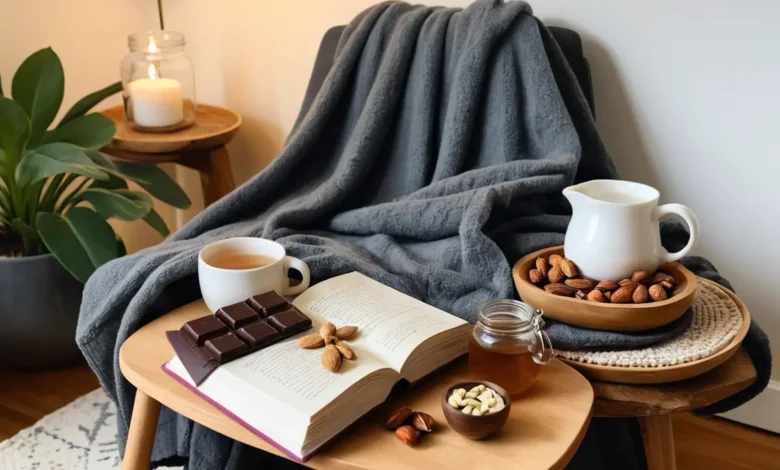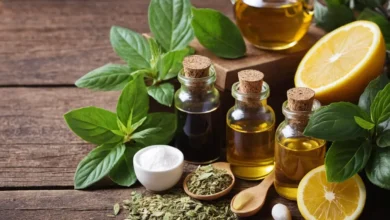How to Relieve Menstrual Cramps with Natural Solutions

Menstrual cramps, or dysmenorrhea, are a common yet uncomfortable experience for many women. They can range from mild discomfort to severe pain, significantly impacting daily activities. While over-the-counter medications are often used to alleviate symptoms, natural remedies can provide effective relief without the side effects associated with pharmaceuticals. This article explores various natural solutions to help relieve menstrual cramps, offering insights that empower you to manage your discomfort holistically.
Understanding Menstrual Cramps
Before diving into remedies, it’s essential to understand what causes menstrual cramps. They are primarily caused by contractions in the uterus, triggered by the release of prostaglandins, which are hormone-like substances involved in pain and inflammation. Factors that can intensify cramps include:
- Hormonal Imbalances: Higher levels of prostaglandins can lead to more intense cramps.
- Uterine Fibroids or Adenomyosis: These conditions can cause increased pain.
- Stress: High stress levels can exacerbate cramps.
- Lifestyle Choices: Poor diet, lack of exercise, and smoking can worsen symptoms.
1. Heat Therapy: Simple and Effective
One of the most popular and effective natural remedies for menstrual cramps is heat therapy. Applying heat can help relax the muscles in the uterus and improve blood flow, providing quick relief.
- How to Use: You can use a heating pad, hot water bottle, or even take a warm bath. Apply heat to your lower abdomen for 15-20 minutes, allowing the warmth to ease tension and reduce pain.
2. Herbal Teas for Relief
Herbal teas are a soothing and effective way to combat menstrual cramps. Several herbs have properties that can help reduce pain and inflammation.
- Chamomile Tea: Known for its anti-inflammatory and calming effects, chamomile tea can help relax the uterus. Drink 1-2 cups daily during your menstrual cycle.
- Ginger Tea: Ginger has potent anti-inflammatory properties. Prepare fresh ginger tea by boiling slices of ginger in water for 10 minutes and adding honey or lemon for taste. Consume it daily to alleviate cramps.
- Peppermint Tea: This tea can help reduce muscle tension and provide soothing effects. Drink it warm for best results.
3. Omega-3 Fatty Acids
Incorporating omega-3 fatty acids into your diet can significantly reduce menstrual pain. These healthy fats have anti-inflammatory properties that may lessen the intensity of cramps.
- Food Sources: Include fatty fish like salmon and mackerel, flaxseeds, chia seeds, and walnuts in your meals. Consider adding a fish oil supplement after consulting with a healthcare provider.
4. Regular Exercise
While it might be the last thing you want to do during your period, regular physical activity can help alleviate cramps. Exercise releases endorphins, which are natural pain relievers.
- What to Do: Engage in light activities such as walking, yoga, or stretching. Aim for at least 30 minutes of moderate exercise most days, especially during your menstrual cycle.
5. Essential Oils for Aromatherapy
Aromatherapy can be a powerful tool in relieving menstrual cramps. Certain essential oils possess pain-relieving and anti-inflammatory properties.
- Lavender Oil: Known for its calming effects, lavender oil can help reduce pain and improve mood. Mix a few drops with a carrier oil (like coconut or almond oil) and massage it onto your lower abdomen.
- Clary Sage Oil: This oil has hormone-balancing properties that can help relieve cramps. Use it in a diffuser or apply it topically with a carrier oil.
- Marjoram Oil: This oil is known for its muscle-relaxing effects. It can be massaged onto the abdomen for pain relief.
6. Dietary Changes for Pain Management
Making simple dietary adjustments can help reduce menstrual cramps. A balanced diet rich in vitamins and minerals can support overall health and alleviate pain.
- Increase Magnesium Intake: Magnesium can help relax muscles. Include foods such as leafy greens, nuts, seeds, and whole grains in your diet.
- Limit Caffeine and Sugar: Both can contribute to bloating and cramping. Reducing their intake may lessen menstrual discomfort.
- Stay Hydrated: Drinking plenty of water can help reduce bloating and improve overall well-being. Aim for at least 8-10 glasses a day.
7. Acupressure and Massage Techniques
Acupressure and gentle massage can help relieve menstrual cramps by relaxing the muscles and improving circulation.
- Acupressure Points: Applying pressure to specific points on the body, such as the lower abdomen and lower back, can relieve pain. For example, pressing on the SP6 point (located about four finger widths above the inner ankle bone) can help reduce cramps.
- Self-Massage: Gently massaging the lower abdomen in a circular motion can help ease tension and alleviate pain. Use essential oils for added benefits.
8. Mindfulness and Relaxation Techniques
Stress management is crucial in relieving menstrual cramps. Incorporating mindfulness techniques can help reduce tension and improve overall well-being.
- Meditation and Deep Breathing: Practicing meditation or deep breathing exercises can help calm the mind and reduce stress levels. Aim for 5-10 minutes of focused breathing each day.
- Yoga: Certain yoga poses, such as Child’s Pose, Cat-Cow Stretch, and Forward Bend, can help alleviate cramps and promote relaxation.
Frequently Asked Questions About Menstrual Cramps Relief
Q: How long do menstrual cramps usually last?
A: Menstrual cramps typically last from a few hours to a few days, often starting 1-2 days before menstruation and peaking during the first couple of days of bleeding.
Q: Are natural remedies effective for everyone?
A: While many find relief through natural remedies, individual experiences may vary. It’s essential to find what works best for you.
Q: Can diet changes help with menstrual cramps?
A: Yes, a balanced diet rich in omega-3 fatty acids, magnesium, and hydration can significantly improve symptoms.
Q: Should I consult a doctor for severe cramps?
A: If cramps are severe or interfere with daily life, it’s advisable to consult a healthcare professional for further evaluation.
Q: Are there any lifestyle changes that can help with cramps?
A: Yes, maintaining a healthy lifestyle through regular exercise, a balanced diet, and stress management can help reduce the severity of cramps.
Conclusion: Embrace Natural Solutions for Menstrual Comfort
Menstrual cramps can be uncomfortable, but with these natural remedies, you can find relief and regain control over your monthly experience. Incorporating heat therapy, herbal teas, dietary changes, and stress management techniques into your routine can significantly improve your quality of life. Remember to listen to your body and experiment with different solutions to discover what works best for you.





